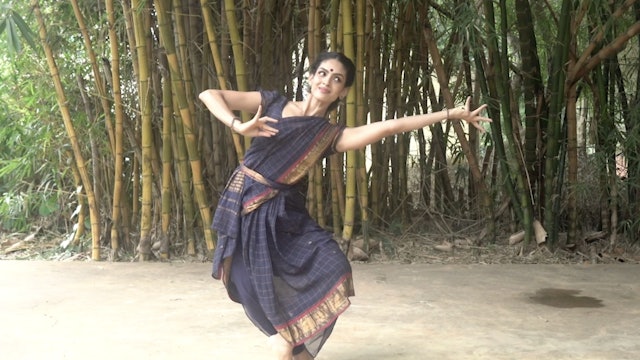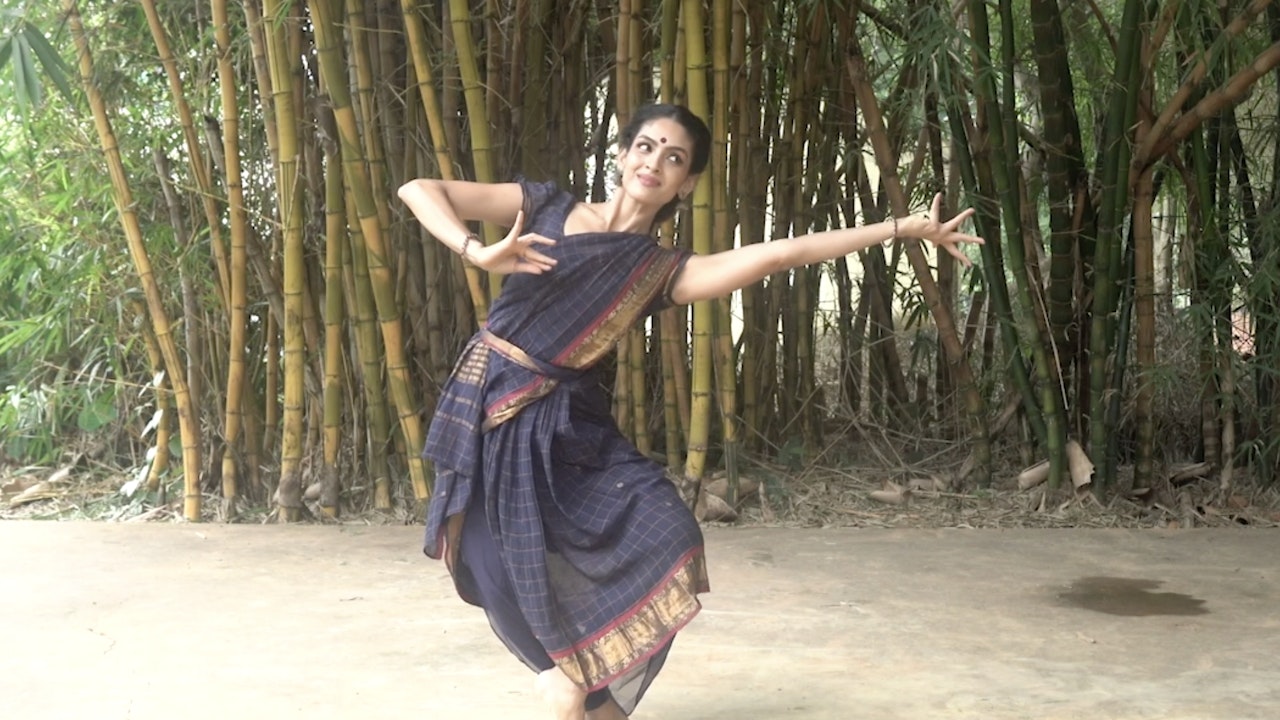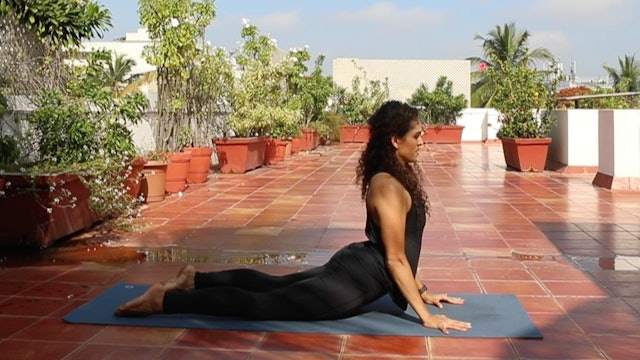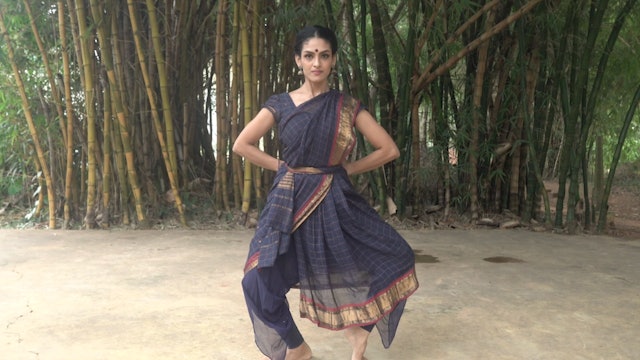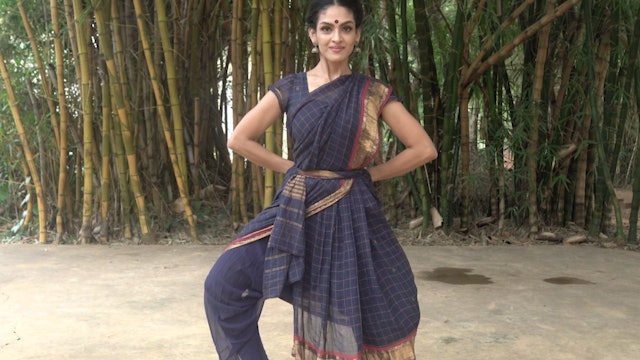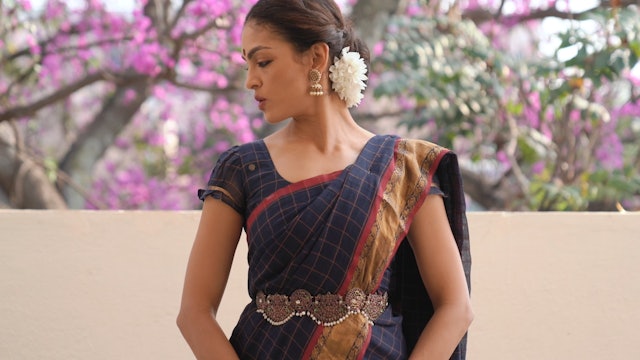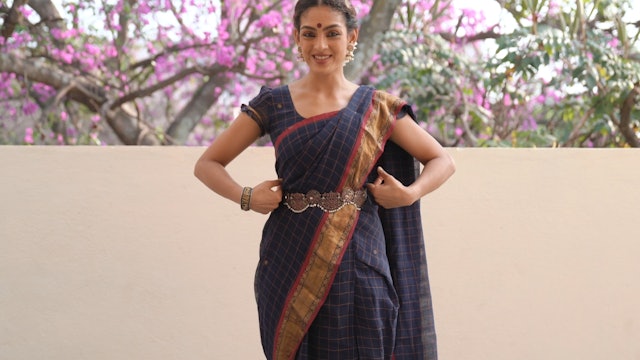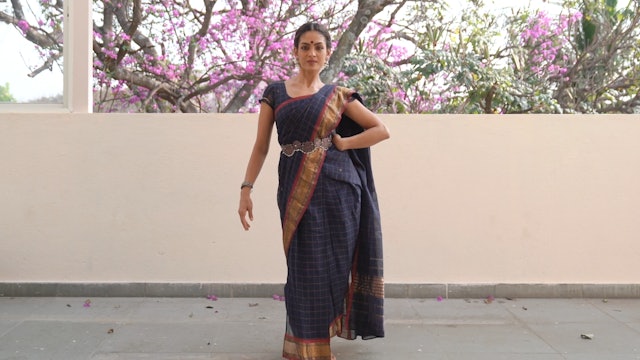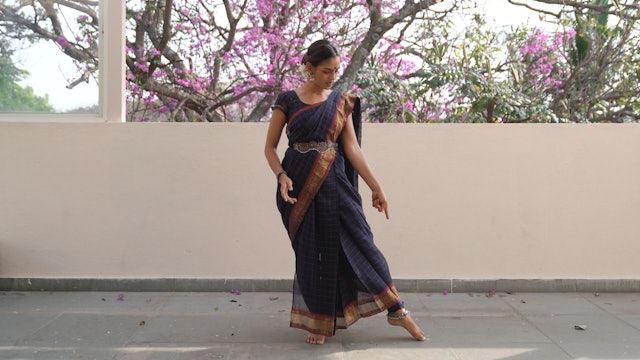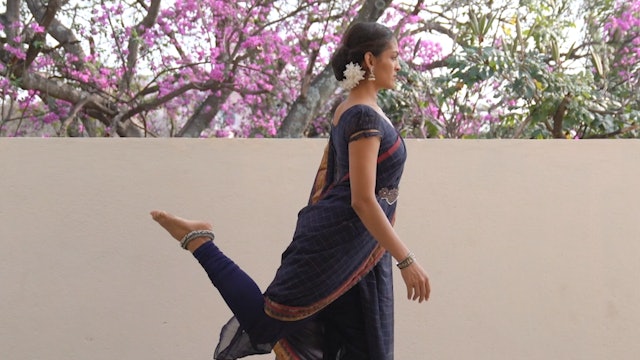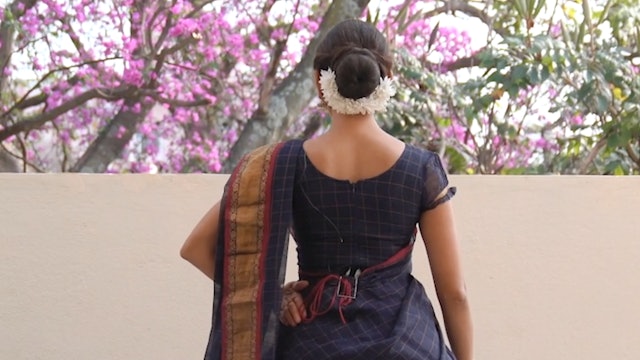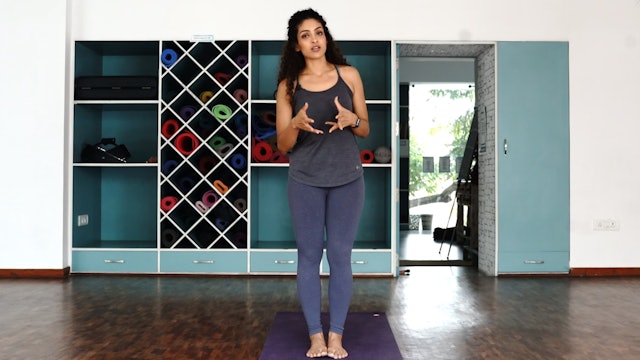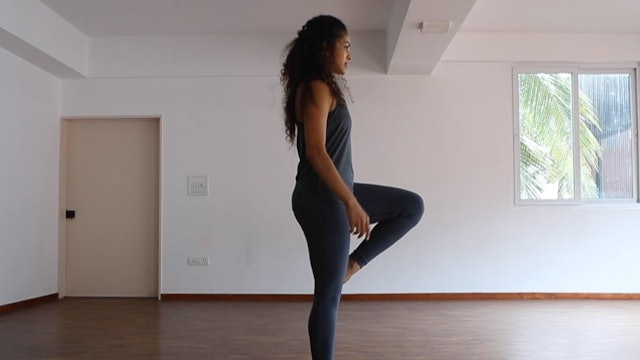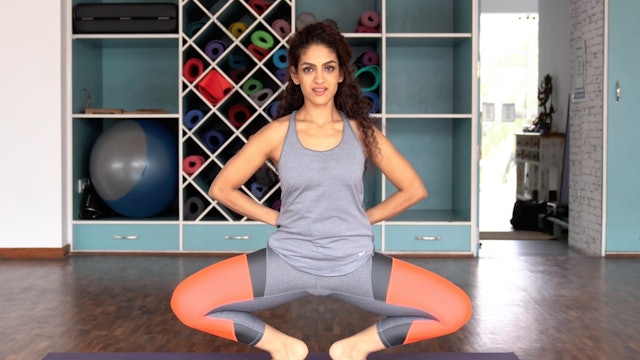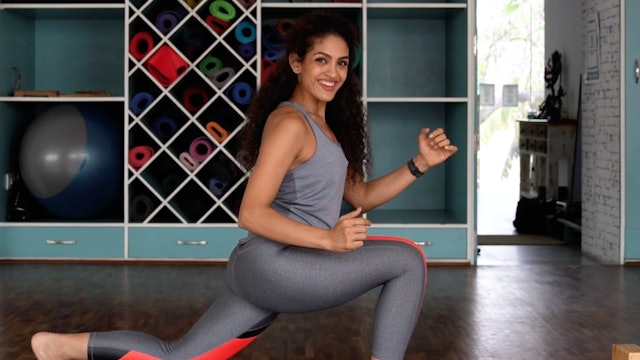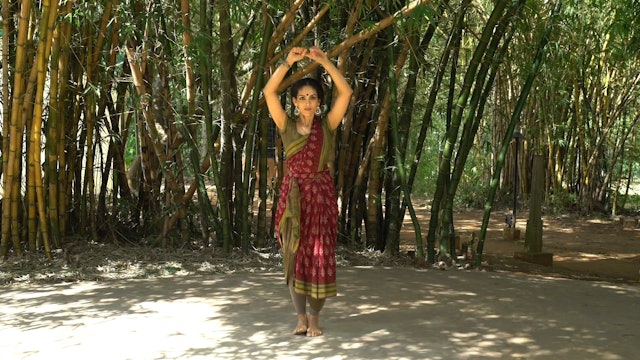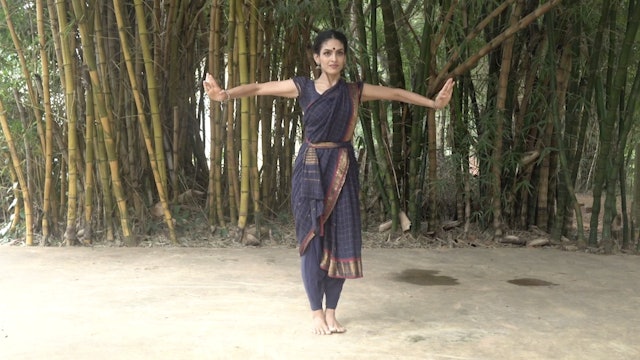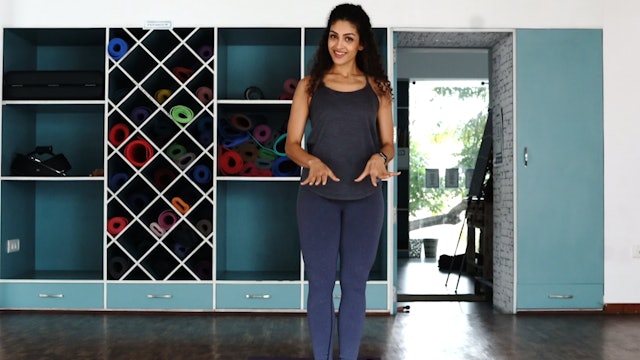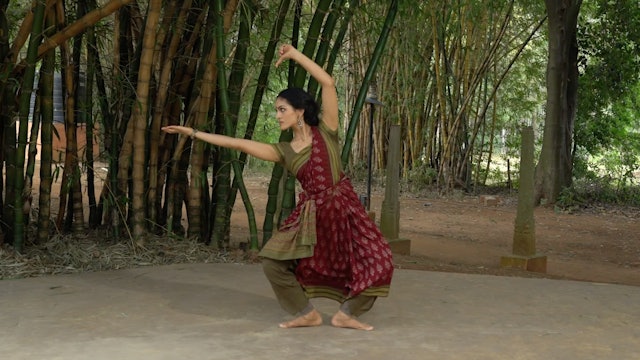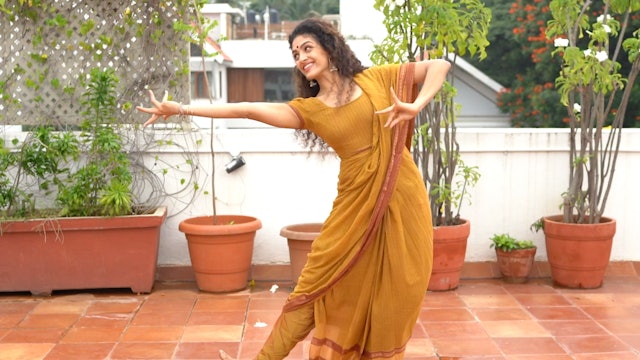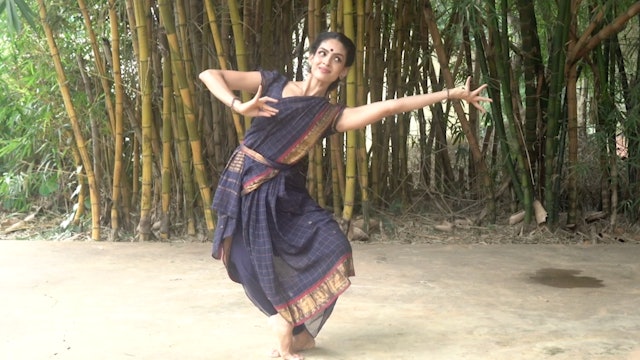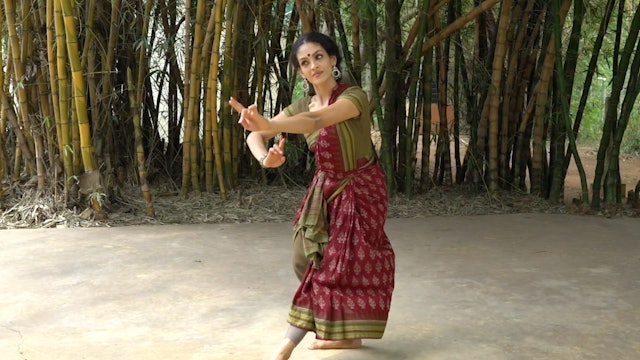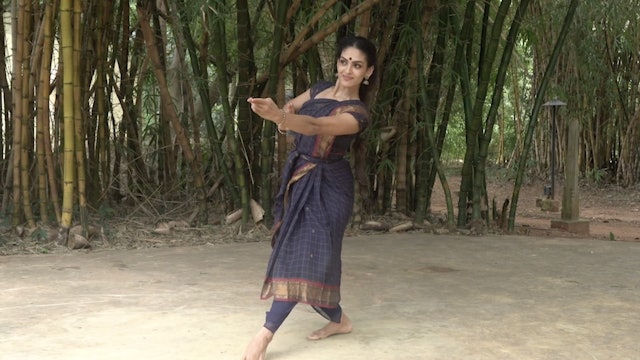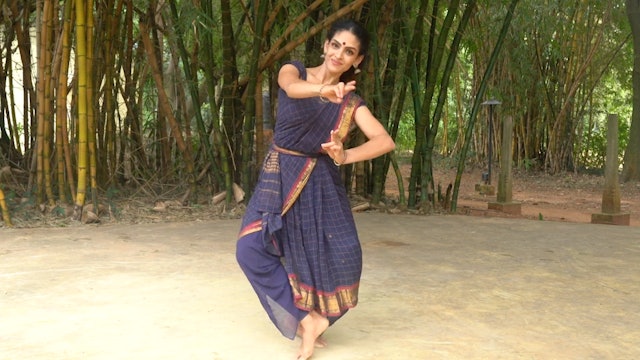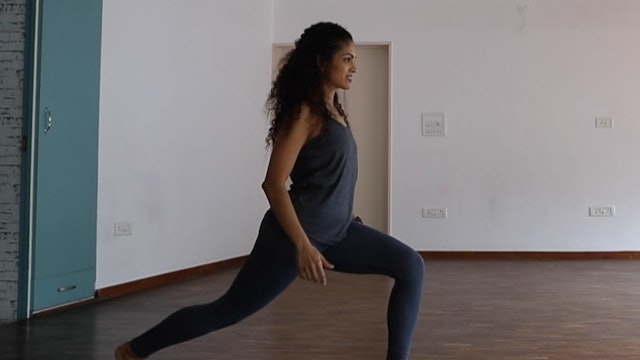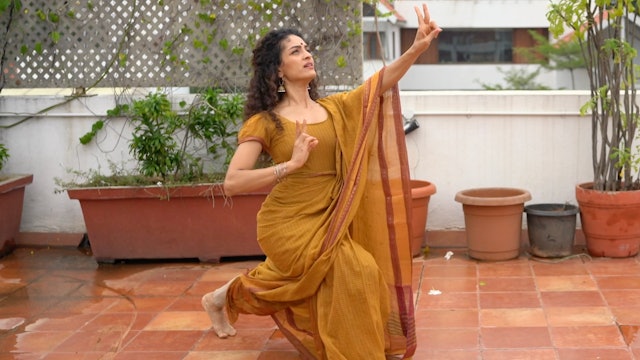-
Warm up flow
This routine approaches your warm-up in a fun, dynamic way. It opens up your body through repetition while paying attention to alignment. You must have been practising all the instructed warm-ups prior to this alongside the first few strength routines in order to follow with ease.
-
Thattu Mettadavu 1 : Tishram
This Adavu has two components, a tapping action with one foot that comprises of the Thattu, and the Udgattitham action on the other leg with a heel. Sometimes both the tap and the Udgattitam can happen on the same foot, depending on the Jathi.
Pointers:
- Try to make sure the heel is lifted pro... -
Thattu Mettadavu 5 : Sankeernam
This Adavu has two components, a tapping action with one foot that comprises of the Thattu, and the Udgattitham action on the other leg with a heel. Sometimes both the tap and the Udgattitam can happen on the same foot, depending on the Jathi.
Pointers:
- Try to make sure the heel is lifted prop... -
Shiro bheda Shloka
The head is considered one of the Angas, or major limbs according to the Natyashastra.
The movements of the head are used not only for the precise control in the execution of Nritta but also to communicate meaning in the context of gesture.
Please refer to the Shloka below for pronunciation. ...
-
Pārśva Bheda Shloka
The side, Parshva is considered one of the Angas, or major limbs according to the Natyashastra.
The movements of the side are used not only for the precise control in the execution of Nritta but also to communicate meaning in the context of gesture.
Please refer to the Shloka below for pronun...
-
Katī bheda Shloka
The hips are considered one of the Angas, or major limbs according to the Natyashastra.
The movements of the hips and waist are used not only for the precise control in the execution of Nritta but also to communicate meaning in the context of gesture.
Please refer to the Shloka below for pronun...
-
Pādah bheda Shloka
The feet are considered one of the Angas, or major limbs according to the Natyashastra.
The movements of the feet are used not only for the precise control in the execution of Nritta but also to communicate meaning in the context of gesture.
Please refer to the Shloka below for pronunciation. P...
-
Janghā bheda Shloka
The shins/ shanks are considered one of the Upāngas, or minor limbs according to the Nātyaśāstra
The movements are used not only for the precise control in the execution of Nritta but also to communicate meaning in the context of gesture.
Please refer to the Shloka below for pronunciation. Plea...
-
Ūru bheda Shloka
The thighs are considered one of the Upāngas, or minor limbs according to the Natyashastra.
The movements of the thighs are used not only for the precise control in the execution of Nritta but also to communicate meaning in the context of gesture.
Please refer to the Shloka below for pronunciat...
-
Jumps in Parallel
This series will deal with a number of short exercises that will help the student develop awareness and alignment when jumping. It must be done in combination with the strength exercises to have maximum benefit.
Please do not do the jumps if you experience knee pain.
You must be warmed up befo... -
Skip jumps
This series will deal with a number of short exercises that will help the student develop awareness and alignment when jumping. It must be done in combination with the strength exercises to have maximum benefit.
Please commence this exercise only after, warming up your ankles, and doing some bal...
-
Aramandi Tips 4
This series will deal with a number of exercises that will work with developing a strong and stable Araimandi. It will also help resolve issues with knee and ankle pain. It must be practised in combination with the Hip openers and Leg strength for maximum benefit.
-
Knee Alignment 6: Lunges and variations
This video will address knee alignment during a lunge, while adding variations that challenge the strength during movement.
Align your knees and stay safe. These videos will help you reinforce alignment and thus help you employ proper usage of the knee joint through movement. The videos will add...
-
Korwe Adavu 1
The Korwe adavu is a combination of previously introduced foot and body articulations. It is called a Korvey adavu as it cannot be placed into any specific category. It has a Tattu, naatu, Bramari, Serikal amongst other movements. Some Korwe adavus also use a Kudittam in the feet.
Things to kee...
-
Korwe Adavu 2
The Korwe adavu is a combination of previously introduced foot and body articulations. It is called a Korvey adavu as it cannot be placed into any specific category. It has a Tattu, naatu, Bramari, Serikal amongst other movements. Some Korwe adavus also use a Kudittam in the feet.
Things to keep...
-
Cat jump
Please do this jump only after doing all the previous jumps in this series. It must be done in combination with the strength exercises to have maximum benefit.
Please commence this exercise only after doing hip openers, warming up your ankles, and doing some balance work with the standing and li...
-
Korwe Adavu (utplavana 1 )
The Korwe adavu is a combination of previously introduced foot and body articulations. It is called a Korvey adavu as it cannot be placed into any specific category. It has a Tattu, naatu, Bramari, Serikal amongst other movements. Some Korwe adavus also use a Kudittam in the feet.
Things to kee...
-
Korwe Adavu (utplavana 2 ) : Instructions
The Korwe adavu is a combination of previously introduced foot and body articulations. It is called a Korvey adavu as it cannot be placed into any specific category. It has a Tattu, naatu, Bramari, Serikal amongst other movements. Some Korwe adavus also use a Kudittam in the feet.
Things to keep...
-
Korwe Adavu (utplavana 2 )
The Korwe adavu is a combination of previously introduced foot and body articulations. It is called a Korvey adavu as it cannot be placed into any specific category. It has a Tattu, naatu, Bramari, Serikal amongst other movements. Some Korwe adavus also use a Kudittam in the feet.
Things to keep...
-
Kartharee Adavu 1
The Kartharee adavu is a movement that begins with a jump, followed by the crossing of the legs. The name could come from the hasta that is used or from the fact that the legs cross.
The bends of the bodies vary in the various types of Kartharee adavu. We usually practice this Adavu to a three ...
-
Kartharee Adavu 2
The Kartharee adavu is a movement that begins with a jump, followed by the crossing of the legs. The name could come from the hasta that is used or from the fact that the legs cross.
The bends of the bodies vary in the various types of Kartharee adavu. We usually practice this Adavu to a three c...
-
Kartharee Adavu 3
The Kartharee adavu is a movement that begins with a jump, followed by the crossing of the legs. The name could come from the hasta that is used or from the fact that the legs cross.
The bends of the bodies vary in the various types of Kartharee adavu. We usually practice this Adavu to a three c...
-
Turning horse jump
Please do this jump only after doing all the previous jumps in this series. It must be done in combination with the strength exercises to have maximum benefit.
Please commence this exercise only after warming up your ankles, and doing some balance work with the standing and lifted leg turned ou...
-
Kartharee Adavu 4: Instructions
The Kartharee adavu is a movement that begins with a jump, followed by the crossing of the legs. The name could come from the hasta that is used or from the fact that the legs cross.
The Last kartharee adavu uses a big jump to land with the legs crossed.
The arms move in a complete mandala, cir...
